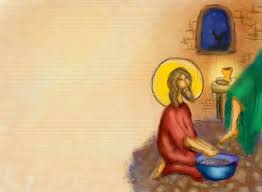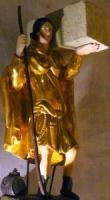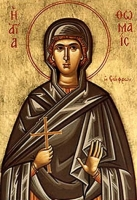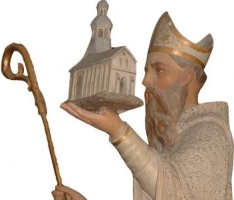Saint Peter Gonzales
Also known as
Pedro, Pietro, Elm, Elmo, Erasmus, Telm, Telmo
புனிதர் பீட்டர் கொன்ஸாலெஸ்
(St. Peter Gonzalez)
மறைப் பணியாளர் மற்றும் குரு:
(Religious, Priest)
பிறப்பு: கி.பி. 1190
ஃப்ரோமிஸ்டா, காஸ்டைல் மற்றும் லியோன் அரசு
(Frómista, Kingdom of Castile and Leon)
இறப்பு: ஏப்ரல் 15, 1246
டுய், கலிசியா, காஸ்டைல் மற்றும் லியோன் அரசு
(Tui, Galicia, Kingdom of Castile and Leon)
ஏற்கும் சமயம்:
ரோமன் கத்தோலிக்க திருச்சபை - (டொமினிக்கன் சபை)
(Roman Catholic Church - (Dominican Order)
முக்திபேறு பட்டம்: கி.பி. 1254
திருத்தந்தை நான்காம் இன்னொசென்ட்
(Pope Innocent IV)
புனிதர் பட்டம்: டிசம்பர் 13, 1741
திருத்தந்தை பதினான்காம் பெனடிக்ட்
(Pope Benedict XIV)
பாதுகாவல்: மாலுமிகள் (Sailors)
நினைவுத் திருநாள்: ஏப்ரல் 14
அருளாளர் பீட்டர் கொன்ஸாலெஸ் ஒரு "கேஸ்டிலியன் டொமினிக்கன் துறவியும் குருவும் (Castilian Dominican Friar and Priest) ஆவார்.
புனிதர் பவுல் (Saint Paul) அவர்களுக்கு ஒருமுறை "டமாஸ்கஸ்" (Damascus) பயணிக்கும் பாதையில் மனமாற்றத்திற்கான அனுபவம் கிட்டியது. கிட்டத்தட்ட அதேபோன்றதோர் அனுபவம் பல வருடங்களின் பின்னர் அருளாளர் பீட்டருக்கும் கிட்டியது. கி.பி. 13ம் நூற்றாண்டில் ஒருநாள், பீட்டர் ஸ்பேனிஷ் நகரான "அஸ்டோர்கா'வில்" (Astorga) தமது முக்கிய பேராலய பதவியொன்றினை பெறும் பொருட்டு, தமது குதிரையை வேகமாக தட்டிவிட்டு பறந்துகொண்டிருந்தார். இடறி விழுந்த குதிரை, பீட்டரை சேற்றில் தள்ளிச் சென்றது. வழிப்போக்கர்கள் வேடிக்கை பார்த்திருந்தனர்.
"அஸ்டோர்கா" (Astorga) நகர ஆயராக (Bishop of Astorga) இருந்த தமது தாய்மாமனிடம் பீட்டர் கல்வி கற்றார். மிக இள வயதிலேயே பீட்டருக்கு ஆயர் ஆலய பதவியளித்தார். மறு மதிப்பீடு செய்யப்பட்டு அவருக்கு பணி வழங்கப்பட்டது.
பின்னர், பீட்டர் "டொமினிக்கன்" சபையில் (Dominican Order) இணைவதற்காக தமது தேவாலய பணியை விட்டார். பீட்டர் பிரபலமான போதகராக மாறினார். அவரது மறையுரைகளைக் கேட்க மக்கள் கூட்டம் குறையாமல் வந்தது. எண்ணத்றோரை கிறிஸ்தவத்திற்கு மனம் மாற்றினார்.
டர் நீதிமன்ற போதகராக அதிக காலம் பணியாற்றினார். அவர் அப்பதவியிலிருந்து ஓய்வு பெற்ற பின்னர், அவர் ஸ்பெயின் நாட்டின் வட மேற்குப் பிராந்தியங்களில் மறை பரப்பு பணியாற்றினார். ஸ்பேனிஷ் மற்றும் போர்ச்சுகீசிய மாலுமிகளுக்காக (Spanish and Portuguese seamen) தனியாக பணிக்குழுக்களை உருவாக்கினார்.
கி.பி. 1246ம் ஆண்டு, ஏப்ரல் மாதம், 15ம் நாளன்று, "டுய்" (Tui) என்ற இடத்தில் மரித்த பீட்டர், உள்ளூர் தேவாலயத்தில் அடக்கம் செய்யப்பட்டார்.
Profile
Castilian nobility who mis-spent a worldly youth. Educated by his uncle, the bishop of Astorga, Spain. Priest, primarily as a step to high office. Obtained special papal dispensation to become Canon of Palencia when he was officially still too young. During a grand Christmas Day entrance into the city, his horse was spooked by the noise of the crowds. It threw him in all his finery onto a dung-heap, much to the delight of the citizens who knew his was a political, not a spiritual appointment.
Dazed, filthy, humiliated, and with the undeniable understanding that his parishioners thought he was a hack, he withdrew from the world for a period of prayer and meditation. It worked. He had a true conversion experience and spent the rest of his life making up for his lost youth and the mockery he made of his position. Joined the Dominicans. Family and friends tried to draw him back to his old life and their planned pursuit of position, but he responded, "If you love me, follow me! If you cannot follow me, forget me!"
Confessor and court chaplain to King Saint Ferdinand III of Castile. Against the opposition of more worldly courtiers, he reformed court life around the king. Worked for the Crusade against the Moors, accompanied Ferdinand into the battlefields, and then worked for humane treatment of Moorish prisoners.
A favourite of the king, Peter feared the honours and easy life would lead him to a return to his previous ways, so he left the court and evangelized to shepherds in the hills, along the waterfronts, and among Spanish and Portugese sailors who still venerate him and consider him their special patron, blending his story with that of Saint Elmo, and calling upon him for protection in the face of bad weather.
Legend says that when he lacked food for those in his charge, he would kneel and pray by a river; fish would leap onto the banks.
Born
1190 at Astorga, Spain
Died
• 15 April 1246 at Saintiago de Compostela, Tui, Spain
• buried in the cathedral at Tuy, Spain
Canonized
13 December 1741 by Pope Benedict XIV (cultus confirmed)
Patronage
• boatmen, mariners, sailors, watermen
• fisherman
• Tui, Spain
• Tui-Vigo, Spain, diocese of
Blessed Lucien Botovasoa
Profile
Eldest of nine children, Lucien was baptized at age 10 in 1918, and made his First Communion at 14 in 1922. From 1922 to 1927, he studied at the Jesuit Saint Joseph College, and became a school teacher, dedicated to both religious and secular education of children; at the end of each class, he would read about the lives of the saints to the students who wanted to stay and listen. On 10 October 1930, in the diocese of Farafangana, Madagascar, he was married to Suzanna Soazana; they were the parents of five, including the child she was carrying when he died.
Lucien joined the Crusaders of the Heart of Jesus on 18 August 1935, and served as its treasurer from 1936 to 1947. He leaned to speak Chinese, German and French, had a fine singing voice, was a musician and director of his parish choir. He was a pious man so drawn to religious life that he searched for material on saints who were married in order to learn to combine the two ways of life; his wife was afraid for a while that he was going to leave her for the monastery. He joined the Secular Franciscans in 1940 and found his spiritual home. He was enthusiastic about spreading devotion to Saint Francis of Assisi and the spiritual benefits of being a Franciscan, often fasted, and wore a khaki shirt and tan trousers instead of the traditional black ones of a teacher; the colour he chose was traditional for tertiaries.
In 1947 some of the local people wanted him to run for political office, but Lucien declined saying that he knew nothing of politics and did not want to be part of it. In the spring of 1947 a persecution of Christians broke out in his region with priests and nuns at first being imprisoned, and then Christians killed at random and in groups for their faith. On the afternoon of 14 April 1947 he learned that the anti–Christian forces would be coming for him; he refused to run and instead spent the rest of the day with his wife and children. He was arrested that night, judged and condemned by the local chief, and executed; his guards and executioner were men he had taught when they were school boys. Martyr.
Born
1908 in Vohipeno, Madagascar
Died
• beheaded with a sword between 10pm and midnight on 14 April 1947 on the banks of the Mattanana River near Ambohimanarivo, Manakara, Madagascar
• he was wearing his tertiary "uniform" – khaki shirt and trousers with a black cord for a belt
• his body was tossed into the river
Beatified
• 10 April 2018 by Pope Francis
• beatification recognition celebtrated in Vohipeno, Madagascar, presided by Cardinal Angelo Amato
Saint Lydwina of Schiedam
புனித லிட்வினா (Lidwina)
பிறப்பு 1380 ரோட்டர்டாம்,
நெதர்லாந்து
இறப்ப 14 ஏப்ரல் 1433 ஷீடாம், நெதர்லாந்து
புனிதர் பட்டம்: 1890
புனித லிட்வினா 1380 ஆம் ஆண்டு குருத்து ஞாயிறன்று, ஓர் ஏழை பெற்றோருக்கு மகளாக, நெதர்லாந்திலுள்ள ரோட்டர் டாமில் பிறந்தார். இவர் பிறக்கும்போதே மிகுந்த அழகுள்ளவ ளாக பிறந்தார். லிட்வினா தனது 15 ஆம் வயதில் பனிச்சறுக்கல் விளையாட்டில் பங்கேற்றபோது, கால் வழுக்கி கீழே விழுந்து விட்டார். இதில் இவரின் விலா எலும்புகள் முற்றிலும் நொறு ங்கி விட்டது. இதனால் மிகுந்த வலியால் துன்பப்பட்டார். தனது 38 ஆம் வயது வரை பெரும் வேதனையை அனுபவித்து படுக் கையிலேயே தன் காலத்தை கழித்தார். லிட்வினாவிற்கு ஏற்ப ட்ட இவ்விபத்தில் தன் வலது கண் பார்வையை இழந்தார். தன் தலையையும், இடது கையையும் மட்டுமே இவரால் அசைக்க முடிந்தது. பற்கள் வலியால் உணவு உட்கொள்ள முடியாமலும், தூங்க முடியாமலும் வேதனைப்பட்டார். உணவு உட்கொள்ள முடியாததால், வயிற்று பசியாலும், வயிற்று வலியாலும் துடித் தார். இதனால் அல்சர் நோயால் தாக்கப்பட்டார். இவரின் மூக்கி லிருந்தும், வாயிலிருந்தும் இரத்தம் கசிந்து கொண்டே இருந் தது. நோய்களின் வலியை தாங்கமுடியாமல் எப்போதும் அழுது கொண்டே இருந்தார். அன்னைமரியிடமும், இயேசுவிட மும் இடைவிடாது செபித்தார். தன் வாழ்நாள் முழுவதும் இயேசுவின் பாடுகளை அனுபவித்தார்.
செபத்தின் வழியாக வலியைத் தாங்கக்கூடிய சக்தியையும், பொறுமையையும், குணம் பெறுவேன் என்ற நம்பிக்கையை யும் பெற்றார். தனது இருபதாம் வயதில் படுக்கையிலிருந் தபடியே புது நன்மை, உறுதிபூசுதலைப் பெற்றார். இதிலிருந்து நாள்தோறும் நற்கருணையைப் பெற்று வந்தார். ஒவ்வொரு நாளும் திவ்விய நற்கருணையை உட்கொண்டபிறகு, இயேசு வின் பாடுகளை, காட்சியாக கண்டார். அவ்வப்போது உயிர்த்த இயேசு, இவருக்கு மலர்களை கொடுத்தார் என்றும், அதன்பிறகு அவரிடமிருந்து புத்தொளியைப் பெற்றதாகவும் லிட்வினாவின் பெற்றோர்கள் கூறியுள்ளார்கள். லிட்வினா இயேசுவோடு இணைந்து பாடுகளில் பங்குக்கொண்டார்.
திவ்விய நற்கருணையின் வழியாக, தன் உடலுக்கு தேவை யான் சக்தியைப் பெற்று, தம் 38 ஆம் வயதில் உடல் முழுவதும் இருந்த நோய்கள் குணமாக்கப்பட்டு புதுவாழ்வு பெற்றார். இவருக்கு உடல் அளவிலும், மன அளவிலும் இருந்த நோய் முற்றிலும் குணமானது. குணம்பெற்ற லிட்வினா, இயேசுவின் சாட்சியாக வாழ்ந்து, தம் வாழ்வின் வழியாக இறைவனின் சீடத்தியானாள்.
இவர் 1433 ஆம் ஆண்டு ஏப்ரல் 14 ஆம் நாள் நெதர்லாந்திலுள்ள ஷீடாம் (Schiedam) என்ற ஊரில் தன் பெற்றோரின் இல்லத்தில் இறந்தார். இவரது உடல் ப்ரூசல் (Brussel) என்ற ஊரிலிருந்த கார்மேல் மடத்தில் அடக்கம் செய்யப்பட்டது. இவர் 1890 ஆம் ஆண்டு புனிதராக உயர்த்தப்பட்டார்.
Also known as
Liduina, Lidwid, Lidwina, Lijdwine, Ludivine, Lydwid, Lydwine
Profile
Her father was a poor noble, and her mother a poor commoner. Lydwina early evinced a devotion of Our Lady of Schiedam. Injured in an ice-skating accident at age 16, the broken rib caused gangrene to set in, and Lydwina became paralyzed and suffered for decades. She spent her time praying, meditating, and offering her pain to God.
She developed a devotion to the Eucharist. Given to ecstatic visions in which she was shown Heaven and Purgatory, participated in Christ's Passion, and was visited by saints. Legend says that she had the gift of inedia, and that her only food for her last 19 years was the Eucharist. Miracles occurred at her bed side. Sometimes accused of being possessed, she was tested by priests. Blind her last seven years. Her final vision was of Christ administering last rites to her. Biography written by Thomas a Kempis.
Born
18 April 1380 at Schiedam, Netherlands
Died
14 April (Easter) 1433 at Schiedam, Netherlands of natural causes
Canonized
14 March 1890 by Pope Leo XIII (cultus confirmed)
Patronage
• against sickness
• against bodily ills
• ice skating
• prolonged suffering
• roller skating
• sick people
• skaters
• skating
• Schiedam, Netherlands
Saint Benezet the Bridge Builder
Also known as
• Benezet of Hermillon
• Benedict, Bennet, Benet, Benoit
Profile
Shepherd. During an eclipse he received a vision telling him to build a bridge over the Rhone at Avignon; angels would watch his flocks while he was gone. When the church and civil officials refused to help him, he lifted a huge stone into place, and announced it would be the start of the foundation; eighteen miracles occurred, the officials recanted, and the bridge was built. Legendary founder of the bridge-building brotherhoods.
Born
c.1163 at Hermillon, Savoy, France
Died
• 1184
• body found incorrupt in 1669
Patronage
• Avignon, France
• bachelors
• bridge builders
Saint Valerian of Trastevere
Profile
Brother of Saint Tiburtius; married to Saint Cecilia. Convert to Christianity. Ministered to Christians imprisoned for their faith. Arrested and tortured for their ministry. Offered his freedom if he would sacrifice to pagan idols; he declined. Martyr.
Born
177 in Rome, Italy
Died
• beaten to death in 229 Rome, Italy
• legend says that a violent storm broke out as they died, leading to the patronage against storms
Patronage
against storms
Saint Thomaides of Alexandria
புனித_தொம்மைஸ் (-476)
ஏப்ரல் 14
இவர் (#StThomaisOfAlexandria) எகிப்திலுள்ள அலெக்சாந்திரியாவில் பிறந்தவர்.
இவரது பெற்றோர் இறைவன்மீது ஆழமான நம்பிக்கை கொண்டவர்கள். அதனால் அவர்கள் இவரை இறைவழியில் வளர்த்து வந்தார்கள். மேலும் இவர் ஆன்மிக நூல்களைக் கற்பதில் மிகுந்த ஈடுபாடு கொண்டிருந்தார். அதனாலும் இவர் இறைவனுக்கு உகந்தவராய் வாழ்ந்து வந்தார்.
இவருக்குப் பதினைந்து வயது நடக்கும்போது மீனவர் ஒருவருக்கு இவர் மணம் முடித்துக் கொடுக்கப்பட்டார். அவர் இவரை நல்ல முறையில் பார்த்துக் கொண்டார்.
ஒருநாள் இரவு அவர் மீன்பிடிக்கக் கடலுக்குச் சென்றிந்தபோது, இவருடைய மாமனார் இதை ஒரு நல்ல வாய்ப்பாகப் பயன்படுத்திக் கொண்டு, இவரைத் தன்னுடைய ஆசைக்கு உட்படுத்த நினைத்தார்; ஆனால் இவர் அவருக்கு இணங்க மறுத்ததார். இதனால் அவர் சீற்றம் கொண்டு இவருடைய தலையை வெட்டிக் கொன்றார்.
இதற்குப் பிறகு அவர் பார்வை இழந்தார். இந்நிலையில் மீன்பிடிக்கக் கடலுக்குச் சென்று திரும்பிய இவருடைய கணவர், தன்னுடைய மனைவி கொல்லப்பட்டுக் கிடப்பதையும், தன்னுடைய தந்தை பார்வையிலிருந்து கிடப்பதையும் கண்டு, என்ன நடந்திருக்கும் என்பதை யூகித்தவராய்த் தன் தந்தையைக் கொன்று போட்டார்.
இவ்வாறு இவர் தான் நம்பிய கடவுளுக்கும், தன் கணவருக்கும் உண்மையாய் இருந்து உயிர் துறந்தார்.
Also known as
Thomais, Tomaide
Profile
Fifth century wife of a fisherman. Died fending off a rape attempt by her father-in-law, and is considered a martyr.
Born
Alexandria, Egypt
Died
• struck with a sword in 476 in Alexandria, Egypt
• buried in the cemetery of a local monastery
• relics later transferred to Constantinople (modern Istanbul, Turkey)
• oil from the lamps at her shrine was used as a remedy against sexual temptations
Saint Tiburtius of Rome
புனிதர்கள் மறைசாட்சி திபூர்சியுஸ் வலேரியன் மாக்சிமஸ்
(*Saint Tiburtius Valerian Maximus*)
1. திருமணம்:
திருமண வயது வந்துவிட்டது என்றுணர்ந்த செசிலியாவின் பெற்றோர் தங்கள் வசதிக்கு ஏற்ற இளைஞரைத் தேர்வு செய்தார்கள். அந்த மணமகனும் கிறிஸ்துவை ஏற்காதவராக இருந்தார். பெற்றோரின் விருப்பப்படி திருமணம் நடைபெற்றது.
2. அர்ப்பணம்:
தன் கணவரிடம்; தனது கன்னிமையை இயேசுவுக்கு அர்ப்பணித்திருப்பது குறித்து தெரிவித்தார். மேலும் தன்னுடைய கன்னிமையைக் காக்க இறைவன் வானதூதர்களை அனுப்பியுள்ளதாகவும் கூறினார். இயேசுவின் அன்பை குறித்து எடுத்துரைத்தார். கணவரிடம் நம்பிக்கை ஏற்படுத்தினார்.
3. ஆர்வம்:
வலேரியன் வானதூதரைப் பார்க்க ஆவல் கொண்டார். அதற்கு முதலில் திருமுழுக்குப் பெற்று கிறிஸ்தவராக வேண்டும் என்று செசிலியா நிபந்தனை விதித்தார். அதன்படி வலேரியன் திருமுழுக்குப் பெற்றார். உடனே வானதூதர் அவ்விருவருக்கும் தோன்றினார்.
4. நம்பிக்கை:
வலேரியனும் தமது கற்பை இறைவனுக்கு அர்ப்பணித்தார். இருவரும் நம்பிக்கையில் நிலைத்திருந்ததன் அடையாளமாக வெள்ளைக் கிரீடம் சூட்டிவிட்டு வானதூதர் மறைந்தார்.
5. மனம் மாற்றம்:
இப்புனித தம்பதியினரைப் பார்த்த பலரும் கிறிஸ்தவ மறைக்கு வந்தார்கள். அவர்களுள் முதலாமவர் வலேரியனுடைய சகோதரர் திபூர்சியுஸ். இவர்களின் வாழ்க்கை விழுமியங்கள் எல்லா திசைகளிலும் எட்டியது.
6. சோதனைகள்:
இரக்கமற்ற உரோமை ஆளுநனுக்கும் செய்தி எட்டியது. விரைந்து வந்த காவலர்கள் மூவரையும் கைது செய்தார்கள். ஆளுநன் தங்களது தெய்வங்களுக்கு வணக்கம் செலுத்துமாறு அவர்களுக்கு ஆளுநன் கட்டளையிட்டான். மறுத்ததால் சாவுக்குத் தீர்வையிடபட்டார்கள்.
7. துணிவு:
இறப்பின் வாசலில் நின்றாலும் துணிவும்ää மனதில் தெளிவும் பெற்றிருந்தார்கள். இதைக் கண்ட அங்கு காவல் காத்துக் கொண்டு நின்ற மாக்சிமஸ் என்பவர் அவர்களிடம் மன்றாடி தன்னையும் கிறிஸ்தவ மறையில் சேர்த்துக் கொண்டான்.
8. மறைசாட்சி:
ஆளுநன் நான்கு பேரையும் கண்டந் துண்டமாக வெட்டிக் கொலை செய்ய உத்தரவிட்டான். இதற்கு மூலகாரணமாக இருந்த செசிலியாவின் கழுத்தை அறுத்து அப்படியே விட்டுவிட்டார்கள். 48 மணி நேரம் கொஞ்சம் கொஞ்சமாக இரத்தம் வெளியேறி இறந்தார்.
Profile
Brother of Saint Valerian. Convert to Christianity. Ministered to Christians imprisoned for their faith. Arrested and tortured for their ministry. Offered his freedom if he would sacrifice to pagan idols; he declined. Martyr.
Died
• beaten to death in 3rd century Rome, Italy
• legend says that a violent storm broke out as they died, leading to the patronage against storms
Representation
with an angel, whips and torture instruments
Patronage
against storms
Saint Bernard of Tiron
Also known as
• Bernard of Ponthieu
• Bernard of Abbeville
• Bernhard...
Profile
Monk in the Poitou area of France. Hermit. Travelling preacher. Founded a Benedictine monastery in the Tiron Forest and served as its abbot. Monks from his house spread throughout the British Isles, spreading the faith and building monasteries.
Born
c.1047 in France
Died
1117
Saint Eustace of Vilna
Also known as
Eustachius, Nizilon
Profile
Young nobleman and chamberlain at the court of Duke Olgierd. Originally a fire worshipper, he converted to Christianity. Martyred for refusing to eat meat on a day of abstinence.
Died
• crucified on a tree in 13 December 1342 at Vilna, Lithuania
• initially buried in Holy Trinity Russian-Greek Church at Vilna
• head translated to the cathedral of Vilna
Canonized
by Patriarch Alexius of Kiow
Patronage
Vilna, Lithuania
Saint John of Vilna
Also known as
Milhey
Profile
Young nobleman at the court of Duke Olgierd. Originally a fire worshipper, he converted to Christianity. Martyred for refusing to eat meat on a day of abstinence.
Died
• crucified on a tree in 13 December 1342 at Vilna, Lithuania
• initially buried in Holy Trinity Russian-Greek Church at Vilna
• head translated to the cathedral of Vilna
Canonized
by Patriarch Alexius of Kiow
Patronage
Vilna, Lithuania
Saint Abundius the Sacristan
Also known as
Abonde
Profile
Sacristan of the Church of Saint Peter in Rome, Italy. His simple, humble, holy life was an inspiration to all who knew him. Saint Gregory the Great wrote a story of his life.
Died
• c.564 of natural causes
• interred in Saint Peter's Basilica, Rome, Italy
Saint John of Montemarano
Profile
Benedictine monk. First bishop of Montemarano, Italy in 1074.
Died
14 April 1095 of natural causes
Canonized
1906 by Pope Pius X
Patronage
Montemarano, Italy
Blessed Hadewych
Also known as
Hadewig, Hedwig
Profile
Daughter of Blessed Hildegundis; sister of Blessed Herman Joseph. Premonstratensian nun. With her mother she founded a convent Mehre, Rhenish Prussia (in modern Germany). Prioress of the convent in 1183.
Born
c.1150
Died
c.1200 of natural causes
Saint Ardalion the Actor
Profile
An actor who specialized in mocking Christianity, and who was very popular with pagan audiences. One day during a performance in Asia Minor he suddenly announced that he had converted and was now a Christian. Martyr.
Died
burned alive in 300 in Asia Minor
Saint Antony of Vilna
Also known as
Antona
Profile
Official at the court of the grand Duke of Lithuania. Martyred with Saint John of Vilna and Saint Eustace of Vilna for refusing to eat meat on a day of abstinence
Died
crucified in 1342
Patronage
Vilna, Lithuania
Saint Lambert of Lyon
Profile
Raised in the court of Clotaire III. Benedictine monk at Fontenelle Abbey. Worked with Saint Wandrille. Abbot of Fontenelle in 666. Bishop of Lyon, France in 678.
Born
northern France
Died
688
Saint Fronto of Nitria
Profile
Hermit. Monk. Abbot of a group of monks in the Nitria Desert in Egypt.
Died
late 2nd century Egypt
Saint Tassach of Raholp
Also known as
Asicus, Asaco, Asico, Tassac
Profile
Early spiritual student of Saint Patrick. First bishop of Raholp, Ireland.
Died
c.495
Saint Maximus of Rome
Profile
Third century martyr.
Died
martyred in Rome, Italy
Saint Domnina of Terni
Profile
Consecrated virgin martyr.
Died
c.200 in Terni, Italy















கருத்துகள் இல்லை:
கருத்துரையிடுக